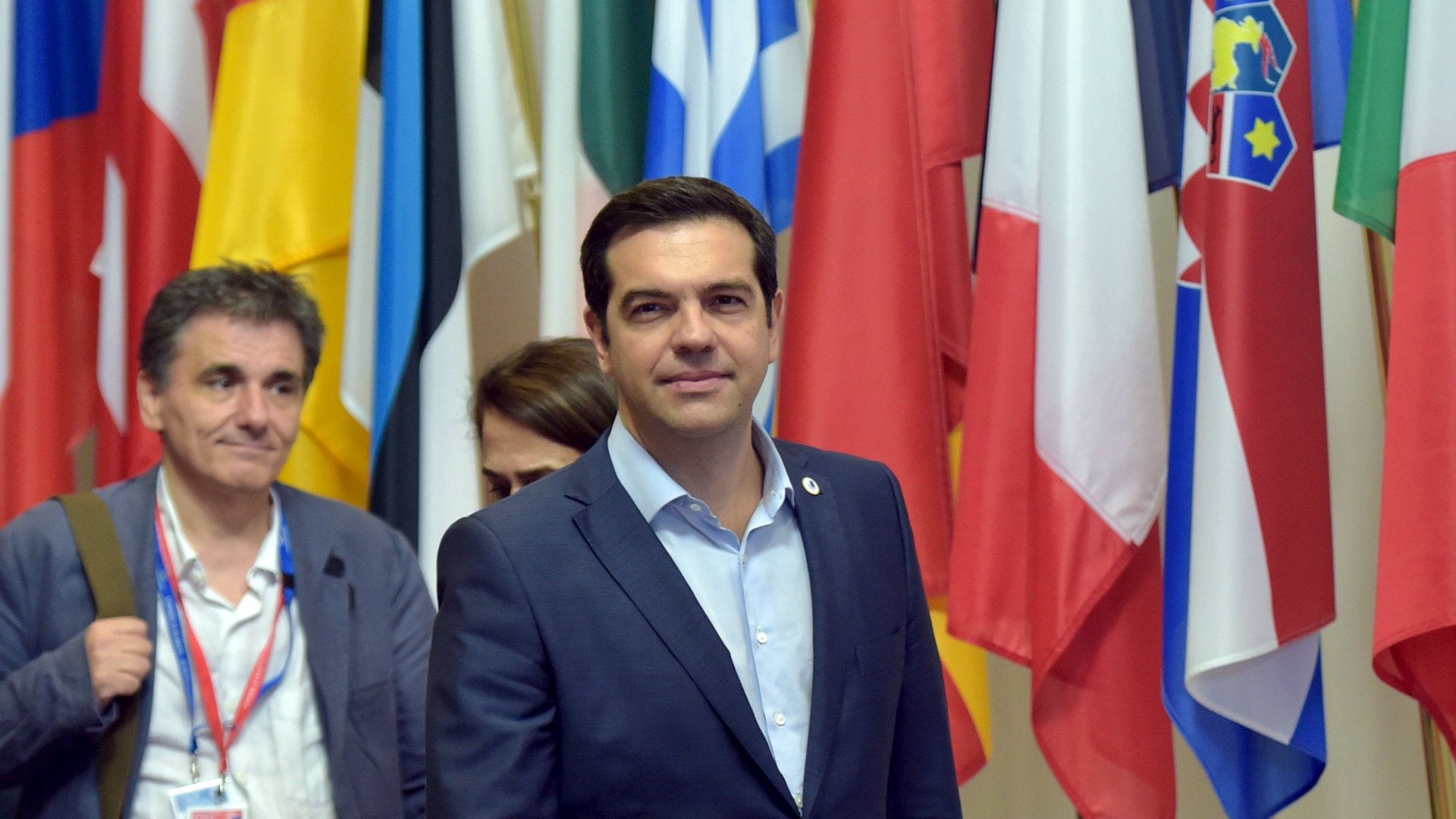A deal is signed (sort of) on a new bailout (probably) to end Greece’s economic misery (not a chance)
Ladies and gentlemen, we have a deal! It took 17 hours of talks, but this morning euro zone leaders emerged, blinking and bleary-eyed, from the negotiating room with an agreement for a new three-year Greek bailout worth up to €86 billion ($95 billion).


Ladies and gentlemen, we have a deal! It took 17 hours of talks, but this morning euro zone leaders emerged, blinking and bleary-eyed, from the negotiating room with an agreement for a new three-year Greek bailout worth up to €86 billion ($95 billion).
Or, rather—stay with us here—they agreed to start negotiations on a new bailout deal if the Greek parliament agrees to pass a series of reforms in the next few days, a few parliaments elsewhere in Europe agree to restart talks on the potential deal, and euro zone finance ministers agree later today on a €12 billion package of bridge financing to tide over the shattered Greek economy in the meantime.
Got it? Those hoping for a definitive conclusion to the neverending negotiations on whether to rescue Greece or cut it loose from the euro zone will be disappointed. But we are closer to putting the threat of “Grexit” to bed than we have been for many weeks. Markets are rallying with relief.
The deal will feature a lot of pain for Greece—financially, politically, and emotionally—but by all accounts it could have been worse. Greek prime minister Alexis Tsipras was subjected to “extensive mental waterboarding” during the talks, which left him resembling a “beaten dog.” Leaders nearly walked away from a deal at several times throughout the night (paywall).
European officials also turned on each other—German finance minister Wolfgang Schäuble snapped at European Central Bank president Mario Draghi at one point, saying “I’m not stupid!” The atmosphere in the room was “tough, even violent” and at times resembled a “kindergarten,” sources told Reuters. One official summed up the mood as “shitty.”
For all of the angst, Tsipras emerged with some credit for pushing back some of the most provocative proposals put forward by hardline creditors early in the negotiations. The idea of a “time out” from the euro zone if Greece didn’t toe the line was scrapped, as was having a foreign-owned fund take control of Greek assets marked for privatization. The proposed deal also promises to consider relaxing loan repayment terms, if Greece keeps up with agreed conditions.
Speaking of conditions, before it even sees a contract offering new aid, the Greek parliament must pass a series of measures—namely, tax increases and pension cuts—by Wednesday (July 15). Other reforms are laid out in great detail, and represent a significant ceding of sovereignty in the name of “rebuilding trust” with creditors, an imperative that the Germans, Dutch, Finns, and other hardliners were keen to stress.
In almost all aspects, the deal that emerged today is worse than the one that the Greeks roundly rejected in a referendum two weeks ago (and, famously, the former finance minister said amounted to “terrorism”). Having appealed to democracy to strengthen his hand in the negotiations, Tsipras found that the gambit served mainly to harden the resistance of creditors, who after all must answer to their own weary electorates. The eventual deal presented to the Greeks “will go down as one of the most brutal diplomatic démarches in the history of the European Union,” declared the Wall Street Journal (paywall).
The Greek prime minister must now cobble together support for the unpopular austerity measures against the wishes of many in his own party. Opposition parties are expected to lend support to pass the required laws, which might require a new governing coalition or even trigger snap elections. Meanwhile, Greece’s cash-strapped banks will remain closed for the foreseeable future, keeping the country’s economy at a virtual standstill.
Having misjudged how close officials were willing to go towards Grexit, analysts are cautious about the prospects for today’s deal actually putting Greece’s economy back on track. “A lot can still go wrong,” said Berenberg Bank (pdf). “We remain in the path of Grexit and everything needs to go perfect to avoid it,” Bank of America wrote in a note to clients.
If you love dangerous and destabilizing brinkmanship, fear not: There is still plenty of scope for more in the coming days and weeks. Things could very easily fall apart, meaning that today’s deal will merely delay Grexit rather than prevent it. But having stared into the abyss, euro zone leaders seem to have decided to keep their union together, for now. This conclusion came much later and with considerably more rancor than expected, but Europe’s often underrated capacity for compromise—to fudge the big decisions when push comes to shove—remains intact.
“In this compromise, there are no winners and no losers,” said European Commission president Jean-Claude Juncker. “I don’t think the Greek people have been humiliated, nor that the other Europeans have lost face. It is a typical European arrangement.”